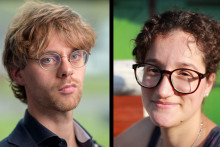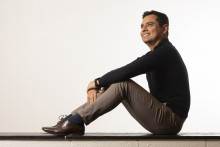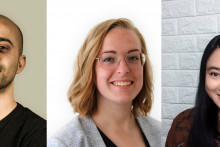Best Supervisor Award 2020
The award was created this year by PhD Network University of Twente (P-NUT) and the Twente Graduate School (TGS). Its goal is to recognize and highlight exemplary cases for all supervisors of doctoral candidates (PhDs and PDEngs) at the UT.
Finalists, one per faculty, were selected based on a survey filled in by PhDs themselves. Each finalist had to supply a short input explaining their supervision philosophy and sharing recommendations for other supervisors. Judges from P-NUT and TGS then selected the winners: Anna Sperotto (Associate Professor at the Design and Analysis of Communication Systems group) and Massimo Sartori (Associate Professor at Biomechanical Engineering group). The winners should officially receive their awards this week.
Runner-ups of the award will also receive prizes. They are: Gül Özerol (BMS), Leon Terstappen (TNW), and Wieteke Willemen (ITC).
How does it feel to be named the ‘best supervisors’?
Sperotto: ‘I was definitely surprised – twice! First, I didn’t know they were doing the survey, and I was so happy to hear that my students took the time to actually fill in details about me, even though I haven’t physically seen them in a long time. That was super cool. And winning was just fantastic.’
Sartori: ‘The same for me. A total surprise, I got an email out of the blue and it really warmed up my heart. This is totally different from winning a scientific award. Sure, those are nice, but this has to do with people. Knowing that I’m appreciated by the people I work with made me really happy.’
What makes a good PhD supervisor?
Sperotto: ‘That is a difficult question, because there are many ways to do that. I personally think you need to put your student first. What really counts is what the student learns, not their academic output.’
Sartori: ‘Yes, I agree completely. You need to be there for them academically, but you also need to care for them personally. You need to make sure that you connect and that you understand them. There is no ‘one size fits all’. You always have to personalize the way you interact, depending on the student. You are not just scientists, you also need empathy and understanding.’
What type of support do doctoral candidates really need?
Sperotto: ‘There is a clear plan for every PhD and you should follow that, but you really need give them extra attention when they start to doubt, when the emotional component comes up. Don’t forget that they are human beings.’
Sartori: ‘They really need to understand what PhD is all about. Especially in the beginning, they need a lot of guidance. It’s a long journey. PhD is like a marathon, you cannot sprint all the way for four years. Students often need somebody to guide their pace. I often see that, in about the middle of the PhD trajectory, the students reach this valley and get stuck. You need to recognize that and help them out of it.’
Do you have any advice for other supervisors on what not to do?
Sperotto: ‘There are of course several supervision styles, that is up to everyone. You can be more directive or collaborative. But what you really shouldn’t do is to leave your student alone, for whatever reason.’
Sartori: ‘I often see that PhDs are asked to produce a certain number of publications, but you can’t apply the same metrics to everyone. You shouldn’t focus on quantity, that creates anxiety and shifts focus away from science and passion for science. Also, make sure that you ask your students how they are doing – as people. It’s a simple question, but it is important.’
p-nut
Roberto R. Cruz Martínez, Board Member of P-NUT: ‘A good supervisor is someone who can be critical but also guide you based on your personal situation. As a PhD you certainly appreciate the sense that someone is trying to help you. They need to help you keep motivation and concentration at the right level. Many PhDs just want to “run with it” at the start, but the supervisor needs to slow you down and guide you in the right direction without being discouraging.’







